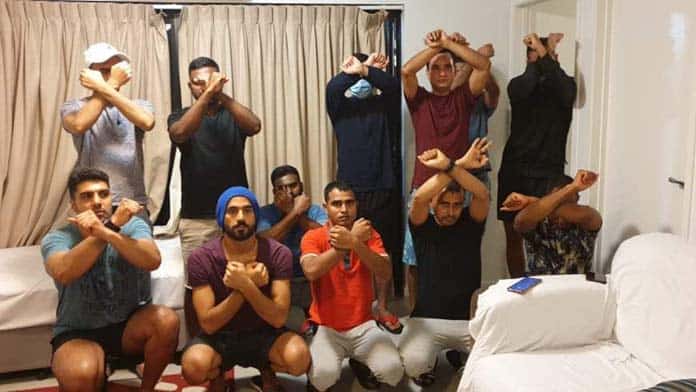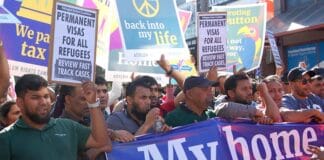When 50 Medevac refugees were released from detention in early March, Border Force issued a statement that they had been released on “final departure bridging visas” to finalise their medical care. Most of them, however, had never even begun to receive medical care.
Border Force went on to restate its tired mantra that detainees should “continue on their resettlement pathway to the United States, return to Nauru or PNG, or return to their home country”. Yet many are rejected from the US and as refugees, they cannot return to their home countries.
But in yet another bizarre Catch-22 style twist, the government has no intention of returning anyone to Nauru or PNG either. Unless detainees actually take legal action to force the issue, the government is not returning anyone to either Nauru or PNG, even if they ask for it.
In fact the government is vigorously resisting the request by one Iranian released refugee to be returned to PNG because—wait for it—he has been released from detention!
Refugees transferred for medical treatment as long ago as 2014 have been requesting to go back to Nauru to escape the misery of Australian detention centres, but have never been sent. Recent court cases have exposed the fact that the detention of the Medevac refugees has been unlawful at least for some of the time, either because they have not been receiving treatment or they have requested to be returned.
To avoid the legal finding that it has been unlawfully detaining refugees, the government will return refugees if they take them to court—rather than have the courts order their release.
On 15 March, a Tamil couple brought to Australia for medical treatment more than a year ago was returned to Nauru. Like others brought from Nauru after the Medevac laws were repealed, they were led to believe that they would be released from detention. But they weren’t, and their health and well-being, like that of others being held in the Darwin hotel, was deteriorating.
They were returned only because they had taken the government to court, where their lack of treatment and their requests to return to Nauru were revealed. But choosing to return to Nauru is not a “choice” that has any meaning when the alternative is indefinite detention in Australia.
After holding another refugee in the Kangaroo Point hotel for over a year, and ignoring his requests to be returned to PNG, similar legal action has resulted in the government now saying that it will “attempt” to return him.
Even as the hotel-detention of Medevac refugees is ending, the government is waging a bitter battle to keep the legal facade of offshore detention intact. While some refugees are being freed, the government is strenuously defending its legal right to hold others in detention.
The result is that the 80 or so Medevac refugees (and around 20 others transferred from Nauru) remaining in detention, are left wondering if they will ever be released. The releases are arbitrary; there is no possible explanation for the fact that refugees with wives, children and family members in the community are being kept in detention, while others are freed. Among those left behind, the incidents of attempted suicide and self-harm are increasing.
What is clear is that the court action is not going to free the refugees; it will be the on-going protests that can provide the momentum to free all those still being detained.
Released into another cage
The discrimination against refugees doesn’t end after their release from detention. Those being freed are getting a scant three week’s accommodation and $100 a week. While that can be pushed to six weeks, after that they are expected to support themselves. With no permanent visas, no Centrelink, no English classes, no right to study (for them or their children), no right to family reunion, the government is creating a permanent poverty-stricken underclass of refugees, vulnerable to exploitation.
No refugees have even been brought to Australia under the normal humanitarian program since March 2020. In practical terms, all the Medevac refugees and all the other boat arrivals on temporary protection visas are permanently in Australia, but they are being denied permanency and the full support provided under the humanitarian program.
The deliberate and blatant discrimination has to stop. The Palm Sunday “Justice for Refugees’ rallies are marching—to end offshore detention, close all the camps, free the Medevac refugees and for permanent visas.
By Ian Rintoul
Join the Palm Sunday rally in your city on 28 March, find details here






